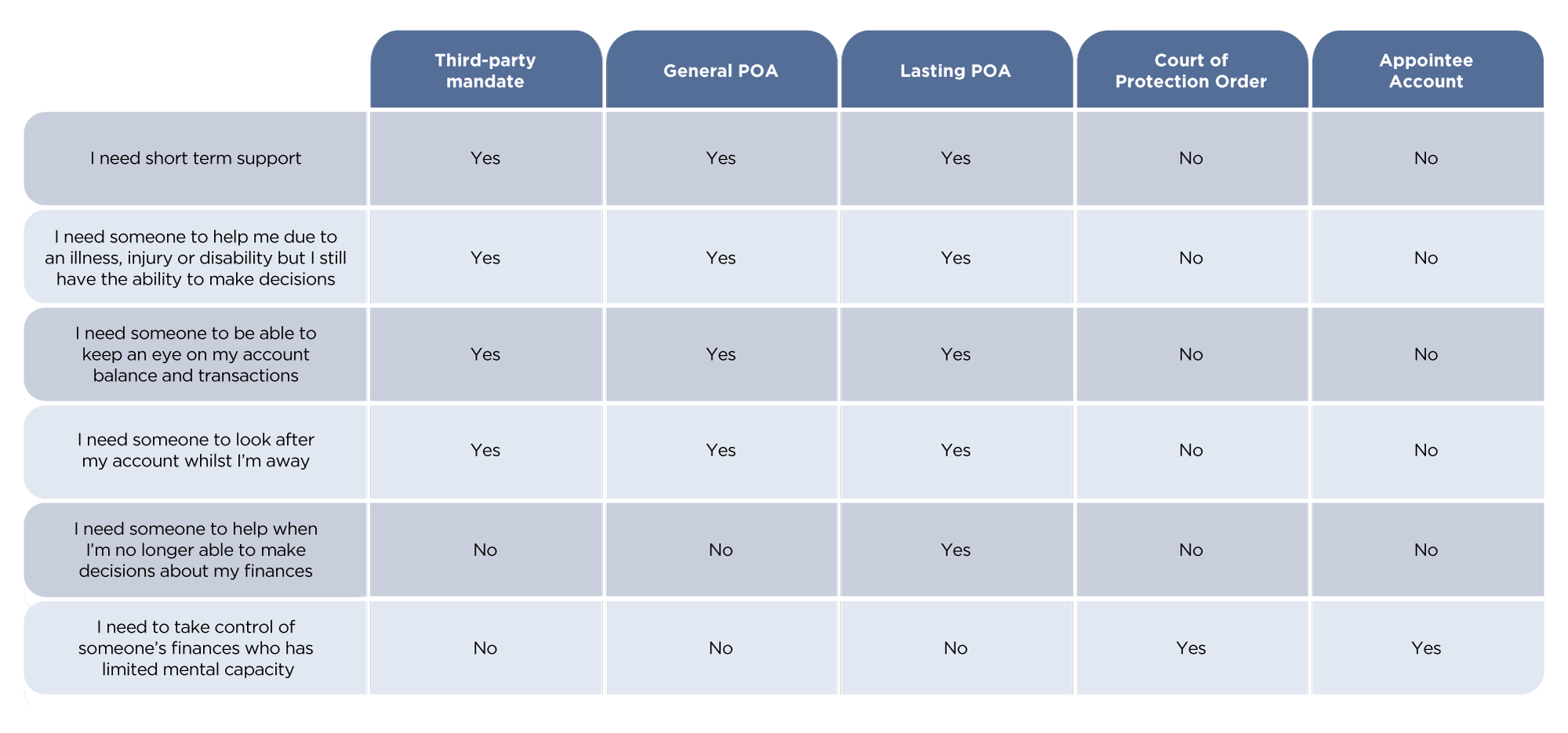
Third-party access
Get someone to help you with your banking
Need help using your bank account?
Giving a friend or family member third-party access could be a good idea.

If you need help using your bank account, or are helping someone else with their finances – for whatever reason – there are a few different options. Read all about them below and decide what is best for you. Please give us a call on 0345 08 08 500 or visit a store to discuss your options or if you need any additional support. If you are not able to visit a store in person, please call us on the number above and find out how we can help you.
We understand that you might be facing difficulties, so we will always try our best to support you, and make this as easy as possible. We’ve also included links to some other useful websites for more help and information at the bottom of the page.
Add someone to your Metro Bank accounts
Here are two quick, easy ways to add someone to your Metro Bank accounts, so they can help you manage your finances.
Give a third party limited access to your account
You can give friends or family members access to your bank account to pay bills and withdraw money on your behalf, with a short-term third-party mandate. You can choose what level of access to give to each nominee. They will not be able to do certain things, like arrange an overdraft or close the account.
Important information:
- You can choose up to four nominees
- Your nominees don’t have to bank with us, but we will need to see their ID and get some details from them
- Your nominees don’t need a credit check
- This is a private arrangement with us, and you do not need to tell the authorities who your nominees are
- You can cancel the mandate at any time.
Download more about third-party mandates:
Make your bank account into a joint account
If you add additional account holders, they’ll have exactly the same access and control over the account as you.
Important information:
- You can add up to three additional account holders to most accounts
- If you have a fixed savings account you can add just one additional account holder
- Current, cash and savings accounts can all be made into joint accounts – with the exception of ISAs
- We may need to do a credit check on any additional account holders, depending on the account type
- Any account holder can remove access from any other account holder, or close the account, at any time.
Help someone else with their banking
If the person you’re helping is able to make their own decisions, they can apply for a power of attorney and appoint you to help them with their finances.
If the person doesn’t have the ability to make their own decisions (and doesn’t already have a lasting power of attorney registered), you’ll need to apply to the Court of Protection in order to be appointed as their ‘deputy’.
A lasting power of attorney can be set up before the account owner loses the ability to make decisions for themselves.

Power of attorney
Power of attorney
A power of attorney (POA) is a legal document that gives you (the ‘attorney’) the authority to make decisions on someone else’s behalf (the ‘donor’). What you can and can’t do may depend on the account holder’s ability to make their own decisions.
Important information
- The account holder can have more than one attorney
- You as the attorney will need to have a credit check
- Depending on the type of power of attorney, it may need to be registered with the authorities
- Instructions and preferences, including when and how you can act, can be added to the document
- The account owner can cancel the power of attorney at any time.
There are different types of power of attorney, and you can set up more than one.
Ordinary power of attorney
Ordinary power of attorney
This covers decisions about the account holder’s financial affairs. It’s typically used to cover for a temporary period such as a hospital stay or holiday, or if they’re finding it hard to get to a store and want you to act for them.
An ordinary power of attorney is only valid while the account holder has the mental capacity to make their own decisions.
If the account holder wants to set up an ordinary power of attorney they should contact their local Citizen’s Advice or get advice from a solicitor, as there’s a standard form of wording that must be used.
Important information
- The account holder can have more than one attorney
- You as the attorney will need to have a credit check
- Depending on the type of power of attorney, it may need to be registered with the authorities
- Instructions and preferences, including when and how you can act, can be added to the document
- The account owner can cancel the power of attorney at any time.
Enduring power of attorney (EPA)
Enduring power of attorney (EPA)
Enduring power of attorneys were replaced by lasting power of attorneys (LPAs) in October 2007. However, if the account holder made and signed an enduring power of attorney before 1 October 2007, it may still be valid. An enduring power of attorney covers decisions about the account owner’s property and financial affairs, and it comes into effect if they lose mental capacity, or if they would like you to act on their behalf.
Lasting power of attorney (LPA)
Lasting power of attorney (LPA)
This is typically used to give someone chosen by the account owner the legal authority to make decisions for them, and comes into effect if the account owner loses mental capacity, or no longer wants to make decisions for themselves. They could set up a lasting power of attorney if they want to make sure they’re covered in the future.
A lasting power of attorney can cover decisions about the account owner’s financial affairs, health, or care.
For us to accept the account owner’s authority for you to act as their attorney, the power of attorney must be one that covers property and financial affairs.
A lasting power of attorney for financial affairs can be used to cover things such as investing money, paying bills, buying and selling property, paying a mortgage and arranging repairs to property.
Once appointed, you can start making decisions while the account owner still has mental capacity, as long as:
- the lasting power of attorney says this can happen AND
- the account owner gives permission.
Otherwise, you can only start making decisions when the account owner no longer has mental capacity.
The account owner can restrict the types of decisions you can make, or let you make all decisions on their behalf.
A lasting power of attorney is completed by contacting the Office of the Public Guardian to request the relevant forms. These can be downloaded or filled in online.
Please note a lasting power of attorney must be registered with the Office of the Public Guardian, and there is a fee to pay for this.
Important information
- The account holder can have more than one attorney
- You as the attorney will need to have a credit check
- Depending on the type of power of attorney, it may need to be registered with the authorities
- Instructions and preferences, including when and how you can act, can be added to the document
- While the account owner still has mental capacity they can cancel the power of attorney at any time.
Court of Protection
Court of Protection
The Court of Protection (CoP) makes decisions on financial or welfare matters for people who can no longer do this for themselves due to mental incapacity, and have no power of attorney in place. The Court of Protection can appoint someone as a ‘deputy’ to make decisions on someone’s behalf, and you can apply to the CoP for a court order to be appointed as a deputy.
There are several reasons people may lack mental capacity – for example, they may have:
- a serious brain injury or illness
- dementia
- severe learning difficulties.
The process of applying to become someone’s deputy can take a while, as the court has to make sure they’re safeguarding people who can no longer manage or look after their own affairs.
Government information on how to apply to be a deputy
Important information:
- The account owner can have more than one deputy
- You as the deputy will need to have a credit check
- Once appointed, you will have complete control of the person’s bank accounts.
Appointee Account
Appointee Account
An account owner can appoint someone to receive their Department for Work and Pensions (DWP) state benefits on their behalf, with a joint account that you both have full access to, including a debit card and Online Banking.
Important information:
- You, person appointed, must be over 18
- There can only be one person appointed
- This can be a Cash Account or a Current Account
- Only benefits can be paid into the account
- You will need to have a credit check and be approved by the DWP before we can open the account.

How to set up third-party account access with Metro Bank
Visit a store
Adding an additional card holder, a joint account holder, or setting up a third-party mandate? All of the existing account holders and all the people being added to accounts will need to come into a store together.
To register as an ‘attorney’, ‘deputy’, or DWP appointee for an existing customer account, we only need the person being added to visit us. Any additional attorneys, deputies or appointees can visit a store separately – but account access will only be set up once everyone being added has visited us.
And for any new customers setting up an account who need third-party assistance and want to register an ‘attorney’, ‘deputy’ or DWP appointee, the account holder(s) and all the people being added to accounts will need to come into a store together.
If you are not able to visit a store in person, please get in touch on 0345 08 08 500 and find out how we can help you.
What to bring
- If the person being added already banks with us, we don’t need to see any ID
- Anyone who doesn’t already bank with us will need to bring ID and proof of address
- We’ll need to see any legal documents in their full original or certified versions
- For DWP appointees, we’ll need to see the original BF57 form.
What you need to open a personal account or apply for credit
Useful websites for more help and information

Age UK
The UK’s largest charity for older people.

Alzheimer’s Society
UK care and research charity for people with dementia and their carers.

Office of the Public Guardian
Government body for UK and Wales, overseeing the activities of deputies, attorneys and guardians (who protect and manage financial affairs for others).

Office of the Public Guardian (Scotland)
Government body for Scotland overseeing the activities of deputies, attorneys and guardians (who protect and manage financial affairs for others).

Citizens Advice
Independent organisation providing confidential information and advice for people with legal, debt, consumer, housing and other problems in the UK.

Friends of the Elderly
Charity providing a whole range of specialist care services that help support older people.

Mental Health Foundation
UK charity helping people to thrive through understanding, protecting, and sustaining their mental health.

MIND
Mental health charity offering information and advice to people with mental health problems.

UK Finance
Trade association for the UK banking and financial services sector.

Carers Trust
UK charity supporting carers with the challenges of their role.

Stroke Association
UK charity working to prevent stroke, and to support those affected by stroke.